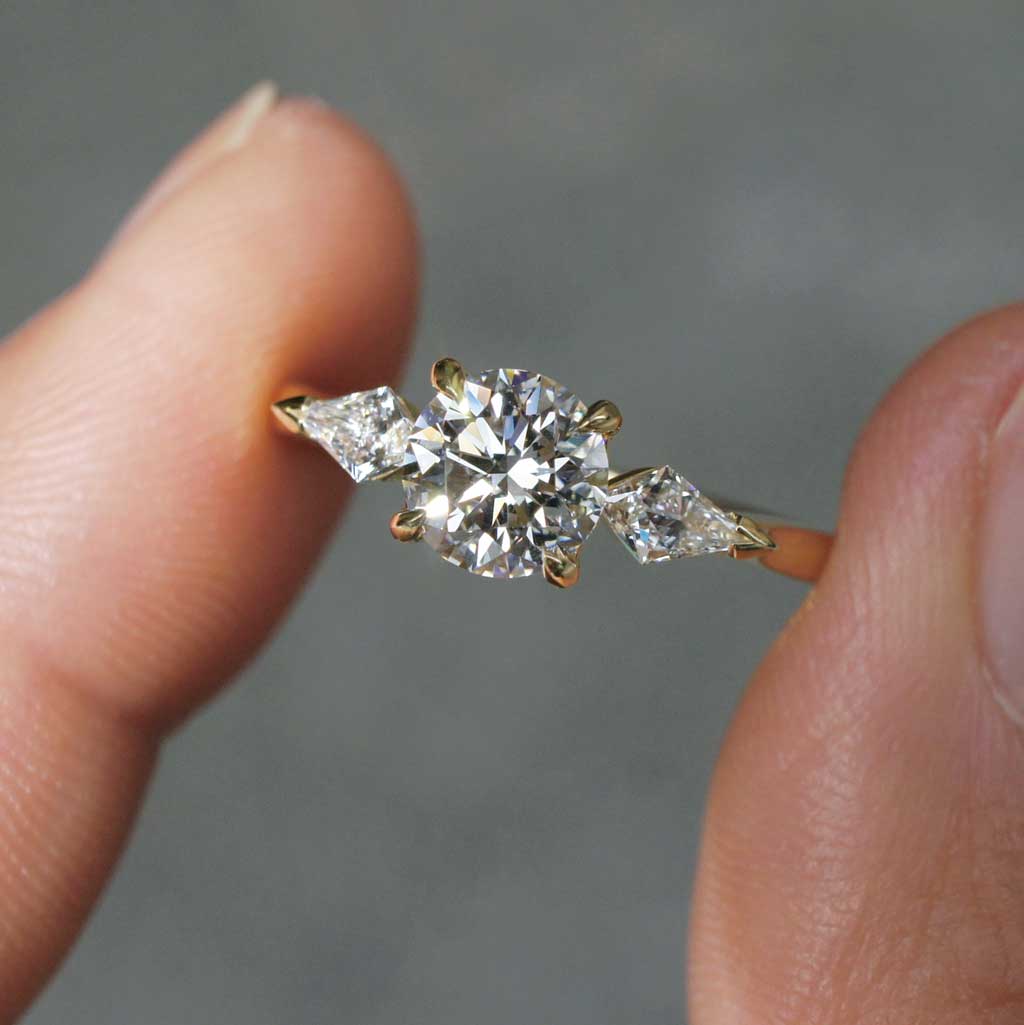Diamonds are the hardest known natural substance known to man. They can cut through any metal or rock and the only way to cut diamond is with another diamond (with the exception of lasers). They are such a popular choice for jewellery as they sparkle more than any other gemstone and due to their exceptional hardness and good durability they make the perfect choice for every day jewellery, such as diamond engagement rings and wedding rings. Due to their top position on the Mohs scale, 10, they can take a very good polish and they are assigned the highest lustre named adamantine, after the Ancient Greek word adamas, which means firm, rigid or unyielding. Clean diamonds are beautiful diamonds! Here are our tips to keep your diamonds clean and looking their best every day.
Diamonds in everyday wear
Diamond has an interesting property named hydrophobia.
Being made of carbon, diamond may be compared to the organic compounds (diamond is elemental carbon). It has one property where it is described as being hydrophobic (a property also possessed by fats, oils, greases and waxes - all organic compounds) where droplets of water bead up on the surface of a diamond, because it has no affinity for water and its surface cannot be made wet by water. This is an important point because the hydrophobic nature of diamond means that this allows fats, oils, greases and waxes to adhere to the surface of the diamond reducing the visible brilliance and fire of the diamond. Anything from sunscreens, moisturisers, make up and oils used in cooking and food preparation can reduce the sparkle, fire and brilliance of diamonds. Even the natural oils and grease from your fingers will adhere to your diamonds thus making regular cleaning inevitable.
It's recommended that one doesn't wear diamond jewellery while preparing food, gardening, performing heavy exercise and showering as oils from hair products and body washes can stick to diamonds and dull their lustre. Fats and oils won't harm your stone, however they will affect your diamond's performance.
Cleaning diamonds at home
Due to diamonds' hydrophobic nature it's necessary to give them a regular clean. This can be done at home with a few simple tools. A simple plan to keep your diamonds sparkling is to soak them once a week in a gentle degreasing solution such as warm water with a few drops of mild dish soap or cloudy ammonia. After the soaking, gently brush with a soft toothbrush that is used exclusively for this purpose. Be sure to get underneath the settings and clean the pavilion facets where oils and dirt can be trapped. Gently rinse in warm water then leave to dry on some clean paper towelling. A hair dryer is a great way to quickly dry jewellery without getting fibres from towels trapped under claw settings.
Precautions
Be careful cleaning jewellery near sinks and open drains. Make sure plugs are securely fitted before rinsing or rinse in a bowl away from drains. Use a rubber sink mat where possible to avoid breakages or knocks to settings if the jewellery is accidentally dropped.
Do not use harsh chlorine based cleaning products (such as household bleach) or abrasives (such as toothpaste) to clean diamond jewellery. These types of harsh cleaners can erode or even dissolve metal resulting in damaged settings or loosened claws. (NB: Do not wear precious metal jewellery in swimming pools or spas as chlorine erodes metal).
Settings check
Check to see if your diamond is still secure in its setting after cleaning, as sometimes dirt accumulation can be the only thing that is still holding a small diamond in place, when a claw has worn away. Gently shake the diamond jewellery piece close to your ear and if you suspect you hear the diamond rattling, take it immediately to your jeweller for inspection.
Other cleaning solutions
There are also good commercial cleaning solutions available to clean diamond jewellery at home. Your local jeweller may sell it or you can visit a jewellery supply store. Normally it's a solution in a small pot that contains a plastic basket. The jewels are dropped into the basket, then lowered into the solution and left to soak for 30 seconds or more depending upon the product. Once the diamonds have soaked, retrieve them and gently clean with a soft brush. Finally rinse them in warm water then dry with a hair dryer. Be careful to read any instructions and only use these solutions for diamonds and perhaps ruby and sapphire. Other gemstones, especially pearls, turquoise and opals can be damaged by these solutions.
If you're passing by your jeweller ask for a quick ultrasonic quick clean. This is normally a free service or a small charge may be incurred for jewellery purchased from other stores. It's also recommended that you get your diamond jewellery cleaned professionally once every 18 months to two years. You'll be delighted to see it all looking brand new again and this is the perfect opportunity to have a jeweller check all your settings and rhodium plate any white gold that may have lost its coating.


